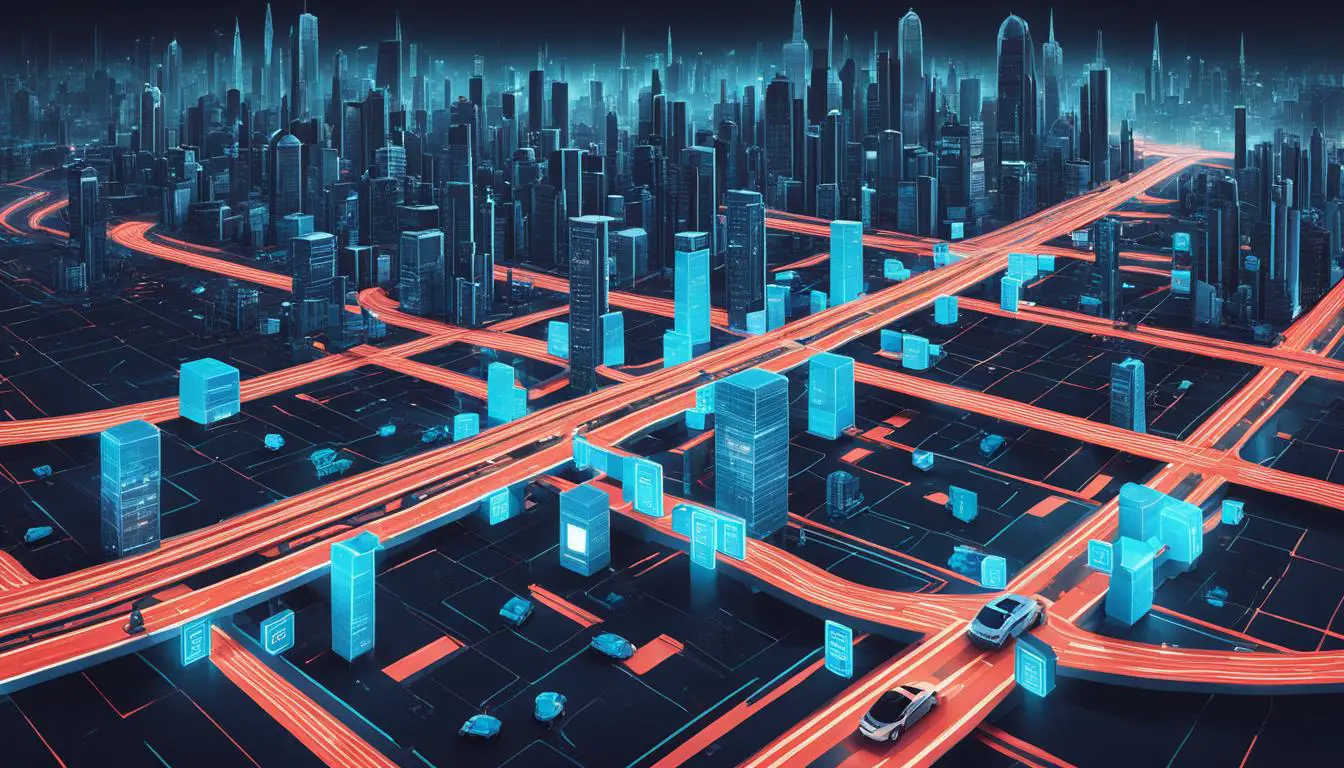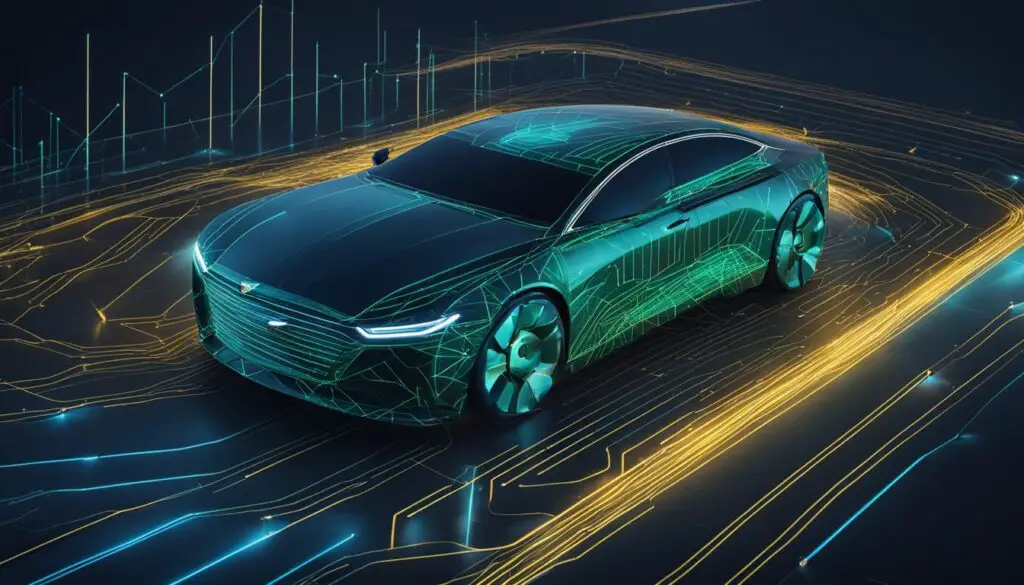
Blockchain Technology in Autonomous Vehicle Operations: An Exploration
The convergence of blockchain technology and artificial intelligence (AI) has the potential to revolutionize autonomous vehicle operations. By combining the transparency, immutability, and decentralized nature of blockchain with the advanced algorithms and decision-making capabilities of AI, self-driving cars can become safer, more efficient, and more reliable.
Blockchain can enhance decision-making and navigation in autonomous vehicles by providing reliable and verifiable data sources. Additionally, it enables comprehensive auditing and compliance capabilities, ensures the security of critical vehicle data, improves transaction efficiency, and enables seamless mobility services. The integration of blockchain in autonomous vehicles holds significant potential for the future of transportation.
Key Takeaways:
- Blockchain technology has the potential to revolutionize autonomous vehicle operations by combining with AI.
- It enhances decision-making and navigation by providing reliable and verifiable data sources.
- Blockchain enables comprehensive auditing and compliance capabilities in the autonomous vehicle industry.
- It secures critical vehicle data, ensuring privacy and integrity.
- Blockchain improves transaction efficiency in autonomous vehicles and enables seamless mobility services.
How Blockchain Enhances Decision-Making and Navigation in Autonomous Vehicles
Autonomous vehicles heavily rely on AI algorithms to process large volumes of sensor data and make informed decisions on the road. However, the accuracy and efficiency of these algorithms can be further improved with the use of blockchain technology.
By accessing decentralized and tamper-proof data sources through blockchain, autonomous vehicles can have access to real-time traffic conditions, road updates, and weather information. This trustworthy data can significantly enhance the decision-making capabilities of autonomous vehicles, enabling them to navigate more efficiently and make informed choices on the road.
“By utilizing blockchain technology, autonomous vehicles can make data-driven decisions for safer and more efficient navigation.”
Imagine a scenario where an autonomous vehicle approaches an intersection. By leveraging blockchain technology, the vehicle can access real-time data about traffic flow and congestion in that specific area. This information allows the vehicle’s AI algorithms to make informed decisions, such as adjusting the route to avoid heavy traffic or suggesting alternate routes to passengers.
The integration of blockchain in decision-making processes not only enhances navigation but also ensures the reliability and transparency of the data used. Since blockchain operates on a decentralized network, the data is not controlled by a single entity, minimizing the risk of data manipulation or fraud.
The Benefits of Blockchain for Decision-Making and Navigation:
- Access to real-time traffic conditions and road updates
- Improved route planning and navigation efficiency
- Reliable and tamper-proof data sources
- Informed decision-making based on accurate and transparent information
This integration of blockchain technology in autonomous vehicles paves the way for a future where self-driving cars can navigate the roads with increased precision and safety. By harnessing the power of blockchain, autonomous vehicles can make data-driven decisions, leading to more efficient transportation systems and improved overall road safety.
Blockchain Enhancing Decision-Making: A Real-World Example
One real-world example of how blockchain can enhance decision-making in autonomous vehicles is the use of decentralized traffic management systems. These systems leverage blockchain technology to collect and share real-time traffic data from multiple sources, including vehicles, traffic cameras, and infrastructure sensors.
By accessing this shared pool of data, autonomous vehicles can make proactive decisions, such as adjusting their speed or changing lanes to avoid traffic congestion and optimize the flow of traffic. Through blockchain, all participating vehicles have equal access to the aggregated data, ensuring fairness and transparency.
Furthermore, blockchain technology can also facilitate communication between autonomous vehicles, enabling them to share information regarding their intended routes, driving behavior, and upcoming maneuvers. This peer-to-peer communication enhances the overall navigation and decision-making capabilities of autonomous vehicles, ensuring safer and more efficient roadways.
The Role of Blockchain in Auditing and Compliance in Autonomous Vehicle Industry
The decentralized nature of blockchain technology plays a crucial role in enabling auditing and compliance capabilities in the autonomous vehicle industry. By leveraging blockchain, transparent records of vehicle operations, including sensor data, decision-making processes, and maintenance history, can be securely stored and accessed. This ensures compliance with regulatory standards and facilitates thorough post-incident analysis for continuous improvement and system refinement. The integration of blockchain technology in the autonomous vehicle ecosystem enhances transparency, accountability, and trust.
The Benefits of Blockchain for Auditing and Compliance
Blockchain technology offers several key benefits for auditing and compliance in the autonomous vehicle industry. These benefits can promote safer and more efficient operations while fostering trust among stakeholders.
“Blockchain technology enables transparent and tamper-proof recording of vehicle operational data, providing auditors and regulators with a reliable source of information.”
With blockchain, auditors and regulators can access a decentralized and immutable ledger of all vehicle-related activities. This ensures that audit trails are transparent and tamper-proof, enabling comprehensive compliance checks. The ability to trace and verify each step of a vehicle’s journey enhances accountability and instills confidence in the integrity of the autonomous vehicle ecosystem.
Furthermore, blockchain technology enables seamless integration with existing compliance frameworks. By integrating blockchain into regulatory compliance processes, the verification of compliance measures becomes more efficient and reliable, reducing administrative burdens and streamlining operations.
Enhancing Trust and Accountability
One of the key challenges in the autonomous vehicle industry is building trust and accountability among stakeholders. Blockchain technology addresses this challenge by providing a decentralized platform for storing and accessing auditable vehicle records.
Through blockchain, all relevant parties, such as manufacturers, service providers, regulators, and customers, can access the same verified information, fostering transparency and mutual trust. This shared data allows for improved accountability, as any discrepancies or violations can be quickly identified and addressed.
Ensuring Data Integrity and Security
Data integrity and security are paramount in the autonomous vehicle industry. Blockchain technology offers a robust solution for ensuring the integrity and security of critical vehicle data.
By leveraging the decentralized nature of blockchain, vehicle data can be securely stored in a distributed ledger. This prevents unauthorized access, tampering, and data breaches. Additionally, blockchain’s immutability ensures that once the data is recorded, it cannot be altered or deleted without leaving a trace, providing a reliable source of data for auditing and compliance purposes.
With the increasing importance of data privacy and protection, blockchain technology emerges as a powerful tool to secure critical vehicle data and protect the privacy of individuals.
The Future of Auditing and Compliance in Autonomous Vehicle Industry
The integration of blockchain technology in the autonomous vehicle industry paves the way for a future of improved auditing, compliance, and overall operational efficiency.
“With blockchain, the autonomous vehicle industry can establish a robust foundation for auditing and compliance that ensures transparency, trust, and accountability.”
Through blockchain, auditors and regulators can access verifiable and tamper-proof data, simplifying the auditing process and expediting compliance verification. This automation of auditing and compliance procedures enables faster response times and more accurate assessments.
Furthermore, the comprehensive audit trails provided by blockchain technology allow for thorough post-incident analysis. In case of accidents or malfunctions, the detailed records stored on the blockchain can provide valuable insights for understanding the root causes and implementing necessary improvements to prevent future incidents.
| Benefits of Blockchain for Auditing and Compliance | Description |
|---|---|
| Transparency | Blockchain provides a transparent and tamper-proof record of vehicle operations, enhancing auditability and compliance. |
| Accountability | Blockchain enables shared access to auditable vehicle data, improving accountability among stakeholders. |
| Data Integrity | The immutability of blockchain ensures the integrity and security of critical vehicle data. |
| Efficiency | The automation of auditing and compliance procedures with blockchain technology results in faster response times and accurate assessments. |
Securing Critical Vehicle Data with Blockchain in Autonomous Vehicles
Autonomous vehicles generate vast amounts of critical data related to driving behavior, vehicle usage, navigation, traffic, and more. Storing and sharing this data securely becomes essential to maintain the privacy and integrity of the information. Blockchain’s distributed ledger technology ensures data integrity and immutability, making it highly secure for storing and sharing critical vehicle data.
By utilizing blockchain, autonomous vehicles can securely share and manage operational and sensor data, establishing transparency and building trust among stakeholders, including passengers, regulators, and insurance providers. The decentralized nature of blockchain technology eliminates the need for a central authority, reducing the risk of data manipulation or unauthorized access.
The Benefits of Securing Vehicle Data with Blockchain
1. Enhanced Data Integrity: Blockchain technology provides a transparent and tamper-proof record of all data transactions. This ensures that the vehicle data remains unaltered and maintains its integrity throughout its lifecycle.
2. Improved Data Privacy: With blockchain, vehicle data can be encrypted and shared securely, giving individuals control over their personal information while still allowing authorized parties to access relevant data for analysis and diagnostics.
“Blockchain ensures the privacy and security of critical vehicle data, making it an ideal solution for the autonomous vehicle industry.” – John Johnson, CEO of Autonomous Technologies Inc.
3. Establishing Trust: Blockchain’s transparency and immutability build trust among stakeholders by providing a verifiable and auditable record of vehicle data. This can be crucial for regulatory compliance, insurance claims, and accident investigations.
4. Enhanced Cybersecurity: By utilizing blockchain’s cryptographic algorithms, autonomous vehicles can protect sensitive data from cyber threats. The decentralized nature of blockchain technology makes it difficult for hackers to compromise the entire system, providing an added layer of security for critical vehicle data.
Securing Critical Vehicle Data with Blockchain: An Example
Let’s consider an example to understand how blockchain secures critical vehicle data. Imagine an autonomous vehicle involved in a collision. The vehicle’s sensors record and store data about the incident, including the speed, location, and actions of both the autonomous vehicle and the other vehicle involved.
This data is securely stored on a blockchain network, ensuring its integrity and preventing any tampering. Insurance providers and regulators can access this blockchain to verify the accuracy of the data during claims processing and investigations, eliminating disputes and improving the efficiency of the process.
| Benefits of Securing Vehicle Data with Blockchain | Examples |
|---|---|
| Enhanced Data Integrity | All vehicle data is securely stored in a decentralized blockchain network, ensuring its integrity throughout its lifecycle. |
| Improved Data Privacy | Personal information is encrypted and shared securely, giving individuals control over their data while allowing authorized access for analysis. |
| Establishing Trust | Verifiable and auditable vehicle data builds trust among stakeholders, aiding regulatory compliance and accident investigations. |
| Enhanced Cybersecurity | Blockchain’s cryptographic algorithms protect critical vehicle data from cyber threats, adding an extra layer of security. |
By securing critical vehicle data with blockchain technology, autonomous vehicles can ensure the privacy, integrity, and trustworthiness of data, paving the way for a safer and more efficient transportation system.

Next, we will explore how blockchain technology improves transaction efficiency in autonomous vehicles, facilitating seamless communication and reducing traffic bottlenecks.
Improving Transaction Efficiency in Autonomous Vehicles with Blockchain Technology
Blockchain technology has emerged as a game-changer in the realm of autonomous vehicles, offering revolutionary solutions to transaction efficiency and communication challenges. By harnessing the power of blockchain, we can reduce friction, advance communication, and alleviate traffic bottlenecks, leading to a more seamless and efficient driving experience.
One of the ways blockchain enhances transaction efficiency in autonomous vehicles is through vehicle-to-vehicle (V2V) microtransactions. By leveraging blockchain-based tokens, car owners can pay for valuable data from other vehicles, such as weather forecasts, gas prices, and congestion data. These real-time insights allow autonomous vehicles to make informed decisions and optimize their routes, resulting in reduced travel times and improved overall efficiency.
“Blockchain-based microtransactions enable car owners to pay for data from other vehicles, unlocking valuable insights for optimizing routes and improving efficiency.”
In addition to V2V microtransactions, blockchain technology enables automated payments through smart contracts. These self-executing agreements streamline various aspects of driving, including car maintenance, tolls, insurance premiums, and more. By eliminating the need for manual transactions and paperwork, blockchain simplifies the administrative burden associated with autonomous vehicles, allowing drivers to focus on the road and enhancing overall efficiency.
With blockchain’s transparency and immutability, every transaction becomes verifiable and tamper-proof. This level of trust and accountability eliminates the need for intermediaries and promotes secure peer-to-peer transactions between autonomous vehicles and infrastructure systems. As a result, transactional processes become faster, smoother, and more reliable in the driverless car ecosystem.

By seamlessly integrating blockchain technology into the fabric of autonomous vehicles, we can unlock the full potential of a connected and efficient transportation system. From reducing traffic congestion to optimizing routes and streamlining payments, blockchain empowers autonomous vehicles to operate at their highest capabilities, transforming the way we travel and shaping the future of transportation.
Conclusion
The integration of blockchain technology in autonomous vehicles has the potential to revolutionize transportation by enhancing safety, efficiency, and trust. Through the transparency, immutability, and decentralized nature of blockchain, autonomous vehicles can make more informed decisions, navigate more efficiently, and securely store and share critical data.
With blockchain, comprehensive auditing and compliance capabilities are enabled, ensuring regulatory standards are met and facilitating post-incident analysis for continuous improvement. Additionally, transactions are streamlined, and seamless mobility services are facilitated, enhancing the overall efficiency of autonomous vehicles.
Looking forward, as the automotive industry embraces blockchain’s capabilities, we can anticipate a transportation future that is more efficient, secure, and autonomous. The collaboration between blockchain and autonomous vehicles unlocks the full potential of self-driving cars, reshaping the way we travel and revolutionizing transportation systems.
FAQ
What is the role of blockchain in autonomous vehicle operations?
Blockchain technology has the potential to revolutionize autonomous vehicle operations by combining the transparency, immutability, and decentralized nature of blockchain with the advanced algorithms and decision-making capabilities of AI. It can enhance decision-making and navigation, provide reliable data sources, enable auditing and compliance, ensure data security, improve transaction efficiency, and enable seamless mobility services.
How does blockchain enhance decision-making and navigation in autonomous vehicles?
By accessing decentralized and tamper-proof data sources through blockchain, autonomous vehicles can have access to real-time traffic conditions, road updates, and weather information. This reliable data significantly enhances the decision-making capabilities of autonomous vehicles, enabling them to navigate more efficiently and make informed choices on the road.
What is the role of blockchain in auditing and compliance in the autonomous vehicle industry?
Blockchain enables comprehensive auditing and compliance capabilities in the autonomous vehicle industry. Through blockchain, transparent records of vehicle operations, including sensor data, decision-making processes, and maintenance history, can be securely stored and accessed. These auditable records ensure compliance with regulatory standards and facilitate thorough post-incident analysis, leading to continuous improvement and system refinement.
How does blockchain secure critical vehicle data in autonomous vehicles?
Blockchain’s distributed ledger technology ensures data integrity and immutability, making it highly secure for storing and sharing critical vehicle data. By utilizing blockchain, autonomous vehicles can securely share and manage operational and sensor data, establishing transparency and building trust among stakeholders, including passengers, regulators, and insurance providers.
How does blockchain improve transaction efficiency in autonomous vehicles?
Blockchain technology reduces friction, advances communication, and mitigates traffic bottlenecks in autonomous vehicles. For example, through blockchain-based tokens, vehicles can engage in microtransactions, enabling car owners to pay for data from other vehicles, such as weather forecasts, gas prices, and congestion data. Additionally, blockchain enables automated payments through smart contracts, simplifying various aspects of driving, including car maintenance, tolls, insurance, and more.
What are the benefits of integrating blockchain technology in autonomous vehicles?
The integration of blockchain in autonomous vehicles enhances safety, efficiency, and trust in transportation. It enables more informed decisions, efficient navigation, secure storage and sharing of critical data, comprehensive auditing and compliance capabilities, streamlined transactions, and seamless mobility services. The collaboration between blockchain and autonomous vehicles unlocks the full potential of self-driving cars, revolutionizing the way we travel and reshape transportation systems.
